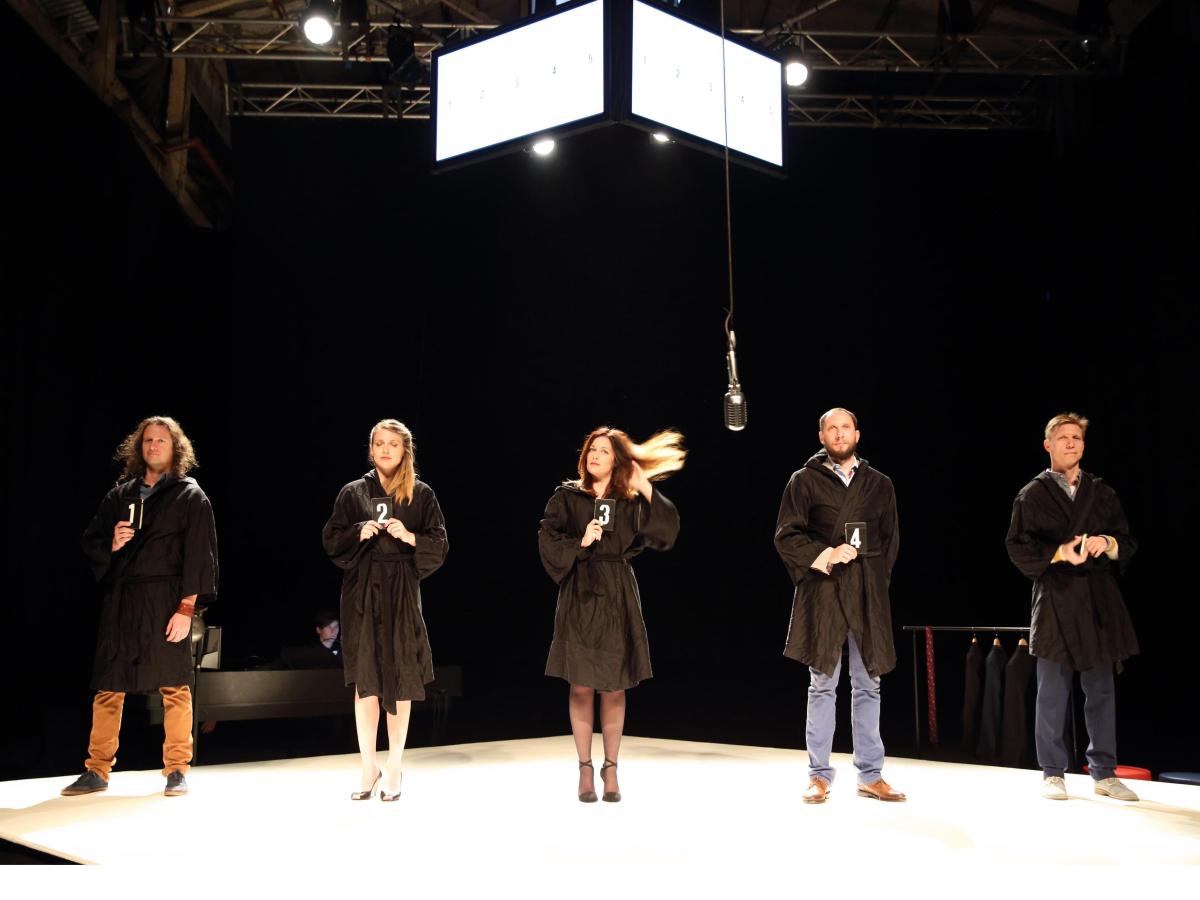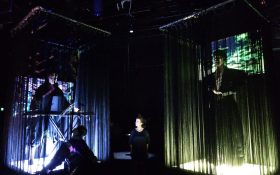Angelo Tijssens in The Border Project / Ontroerend Goed’s Fight Night. Image by Tony Lewis.
Belgium’s Ontroerend Goed are frequent visitors to Australia. They’ve staged their immersive, often interactive theatre experiences many times in Adelaide and Sydney, mostly as festival fare. They have also collaborated with the Sydney Theatre Company and, on this new show, with Adelaide’s Border Project.
Fight Night introduces five candidates fighting for political office.
Belgian actors Valentin Adhaerens and Charlotte Vandermeersch and Australians Roman Vaculik, Sophie Cleary and David Heinrich stand in a row on a canvas-covered stage fielding questions from a check-suited compère (Angelo Tijssens). He paces around the ring flourishing an old-style microphone reminiscent of boxing commentators.
After the bell rings at the end of the many rounds, and armed with our keypads, the audience is kept busy voting according to our political whims. At first we judge just by the candidates’ faces. As they’re progressively revealed, we judge by the candidates’ clothes, voice, affability, their demographic pitch and then general opinions.
The candidates are slowly whittled down as the losers are voted off – despite defensive horse-trading and attempts to re-fashion their pitches. At one perceptive moment, the compère puts himself up as a candidate. But thankfully, at least by my audience, is soundly rejected.
This is witty, engaging political theatre even if no tangible political subject is raised. The target is the democratic process itself. The spin and manipulative empathies of the candidates are plain to see, but so too is their effectiveness; we victims who vote for them are as lampooned as the candidates.
The candidates and the audience are asked general questions about the place of religion in politics; what abusive slurs are worse than others; do we trust the candidates; do we, indeed, trust our fellow audience and the emerging, opinionated majority that we are forced to be a part of?
Demographic questions through the show build an often uncomfortable picture of how this audience is or isn’t like you. And just when the pace of Fight Night slackens, we stumble unknowingly into a coup.
Sophie (who had my vote until now) leads a rebellion against the shams of a two-party democracy, and urges her supporters to quit the process and hand in their keypads. Now we are all left with just one demagogue, David. To my shame, the majority in my audience – and thus me – are convinced by him to vote these dissenters out of the theatre, stripping them of rights and homes.
The lesson is that politics (and going to the theatre) can be a dangerous game which requires careful political scrutiny and vigilance. And all this without one policy position being debated!
Director Alexander Devriednt delivers a one-idea work of theatre which could have more luxuriously employed video and other colourful political bunting. But the tyranny of majority rule and the evil applications of reality TV techniques are still clear to see, and the climax of Fight Night is chilling. With policy issues and detail left unexplored, his model suits well its translation to other cultures. The Turkish and Chinese versions are already commissioned.
Rating: 3 ½ out of 5 stars
Fight Night
Sydney Theatre Company presents The Border Project, Ontroerend Goed, Drum Theatre Plymouth and Richard Jordan Productions Ltd, in association with Adelaide Festival.
Created by The Border Project and Ontroerend Goed with text by Alexander Devriendt and the original cast.
Wharf Two Theatre, Walsh Bay
www.sydneytheatre.com.au
20 March – 13 April





